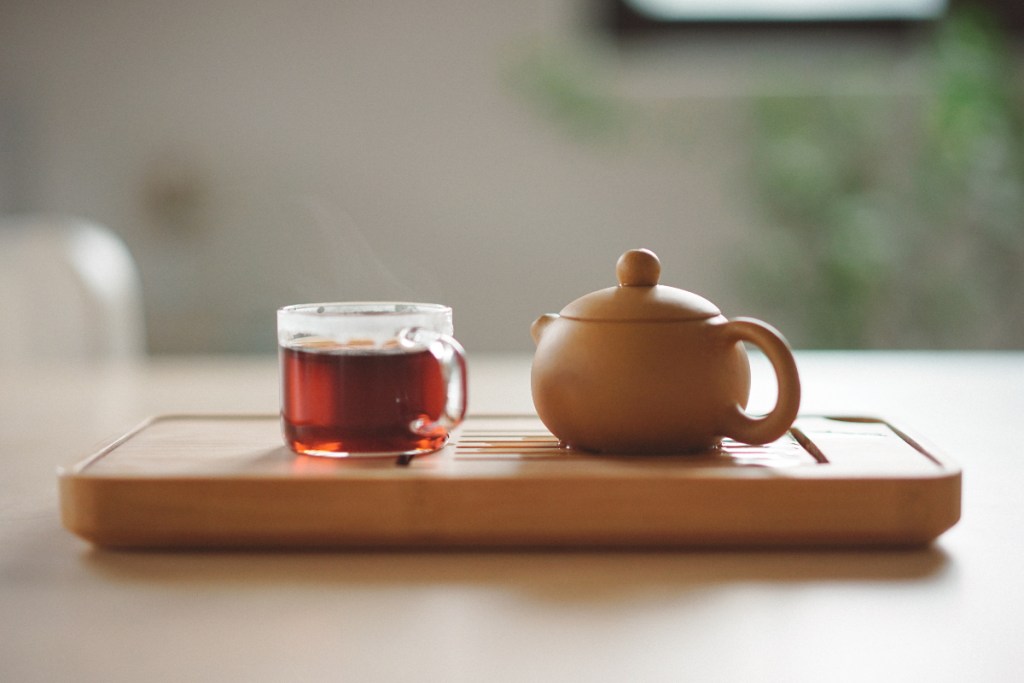Caffeine is everywhere, whether you realize it or not. While many get their caffeine kick from coffee or energy drinks, this stimulant is also found in chocolate, energy bars, and cough syrup. Another strong source of caffeine? Tea.
While many of us associate tea with sleepy time chamomile or relaxing ginger, many varieties contain as much caffeine as a standard cup of coffee. Whether you’re on the hunt for more sources of caffeine or trying to avoid it, we’ll walk you through a rundown of the caffeine content and nutrition profiles of several kinds of tea and compare them to some of your other favorite caffeinated beverages.

Caffeine: coffee vs. soda vs. tea
Not all caffeinated drinks are created equal, so their caffeine content varies significantly. Even within the same type of drink, different brands and varieties contain varying amounts of caffeine, so be sure to read the nutrition label before purchasing. As a general rule, here is the average amount of caffeine in a few popular beverages:
- Coffee: 95 milligrams per eight ounces
- Energy drink: 70 milligrams per eight ounces
- Tea: About 30 milligrams per eight ounces
- Soda: 20 milligrams per eight ounces

Does caffeine cause any health issues?
For the most part, caffeine is perfectly safe in moderation. The FDA recommends a maximum of 400 milligrams per day or the rough equivalent of four eight-ounce cups of coffee.
However, like any drug, caffeine can cause uncomfortable side effects, and many experience post-coffee jitters, insomnia, rapid heartbeat, and dehydration. Also like many drugs, caffeine is highly addictive. If you become addicted to caffeine and try to limit your consumption, you’ll likely experience withdrawal symptoms like headaches, irritability, and hot flashes.
Additionally, caffeine may be detrimental to pregnancy, with some experts recommending limiting consumption to 200 milligrams a day, while others say to abstain from caffeine altogether. This is because caffeine consumption during pregnancy can lead to delayed fetal growth, miscarriage, and fetal obesity.
Despite these risks, experts emphasize that, in moderation, caffeine can have positive impacts on your health. Caffeine can improve memory and brain function, help ward off certain cancers, and even reduce the risk of kidney stones, among other benefits.
Health benefits and caffeine content in different tea varieties
Caffeine or no caffeine, tea can improve both mental and physical health and wellness. Below, we break down some popular tea varieties, their caffeine content, and their health benefits.
- Black tea (47 milligrams of caffeine per eight-ounce cup): Perhaps the most popular tea in the world, black tea is the basis for Earl Grey, English breakfast, and other well-known varieties, and can reduce the risk of stroke and improve gut health.
- Green tea (40 milligrams per cup): Another popular variety, green tea can help protect the body against breast, lung, and colorectal cancers, all while warding off clogged arteries and neurological damage.
- Oolong (37 milligrams per cup): Particularly popular in Asia, oolong tea is full of antioxidants and may help lower “bad” cholesterol levels.
- Red tea (caffeine-free): Also known as rooibos, this caffeine-free option is made from a special herb found in Africa. This variety is also full of antioxidants and promotes heart health.
- Chamomile (caffeine-free): Chamomile tea is best known as a sleep aid, but studies show it offers powerful protection against diabetes complications, such as vision and kidney damage, and is a tried and true method for managing pain and illness.
Long story short, if you prefer caffeinated tea, the health risks are minimal as long as you stay below the recommended daily amount. Further, to limit your caffeine consumption, try shortening your steep time to decrease the strength of your beverage. If negative effects do arise, they are typically not serious and resolve in a short period of time. If these negative effects persist or feel particularly strong, speak to a health care provider for more information.
Disclaimer: BlissMark provides information regarding health, wellness, and beauty. The information within this article is not intended to be medical advice. Before starting any diet or exercise routine, consult your physician. If you don’t have a primary care physician, the United States Health & Human Services department has a free online tool that can help you locate a clinic in your area. We are not medical professionals, have not verified or vetted any programs, and in no way intend our content to be anything more than informative and inspiring.




